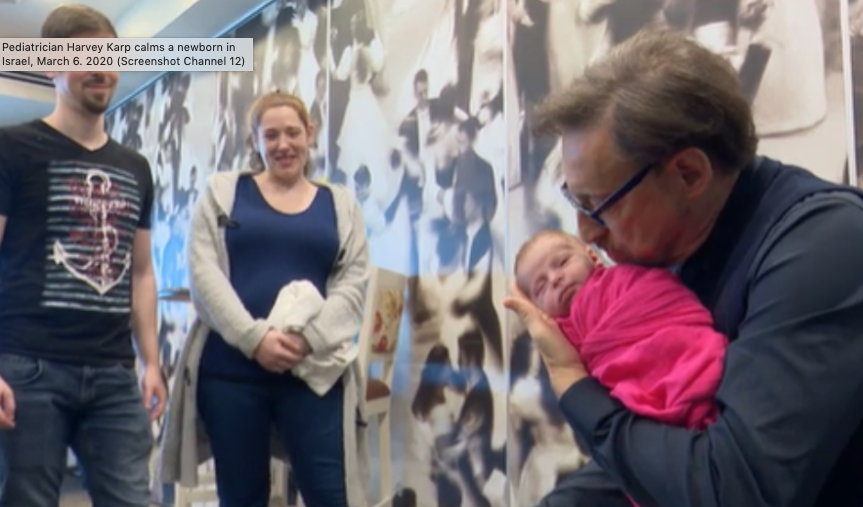Bestselling pediatrician Harvey Karp, who developed the ‘5 S’s’ technique for soothing fussy infants, visits Israel to promote a Hebrew translation of his book
By SIMONA WEINGLASS 8 March 2020, 11:25 pm Times of Israel
It usually starts about a month after new parents bring their baby home from the hospital. Their bundle of joy begins to cry inconsolably for no discernible reason. The baby has been fed, burped and changed but nevertheless howls with displeasure for long stretches of the afternoon and evening.
Not all babies go through these bouts of ceaseless crying, popularly known as colic. But the condition, which affects about one in five babies, can bring otherwise competent adults to a state of helplessness.
Dr. Harvey Karp, 69, a pediatrician and author, is one of the world’s most famous gurus for parents of colicky babies. His 2002 book, “The Happiest Baby on the Block,” has sold over a million copies, while its accompanying DVD is the most-watched parenting video of all time, according to The New York Times.
Last week, Karp visited Israel to promote a new Hebrew-language translation of “The Happiest Baby on the Block,” and sat down with The Times of Israel to share his insights on child-rearing for parents who are sleep-deprived and in need of help.
“My work is very specific,” said the soft-spoken Karp. “Do this special technique and the baby will cry less.”
Karp’s baby calming technique consists of five S’s: swaddling, side lying, shushing, swinging and sucking, which if done correctly and in tandem, will switch on a baby’s calming reflex, he said.
In fact, the internet is full of home videos of parents performing the five S’s on wailing babies. As the parents progress through the five steps, crying gives way to blissful repose.
Some scientific studies have suggested that the five S’s are in fact an effective technique.
When Karp’s book came out in 2002, he said, what made it different from other parenting advice books was that it rejected the notion that colic is caused by stomach pain. Instead, he posited that it is caused by over-stimulation of an immature nervous system.
“Of course, some babies have gas, but that’s not enough to make them cry for two hours straight. Also, why is it that they calm down when you go for a car ride? If you had stomach pain, going for car ride wouldn’t help your stomach. Babies don’t get colic until they’re one month to six weeks old. But they have gas when they’re first born. So that theory doesn’t make sense.”
“The Happiest Baby on the Block” in Hebrew (Steimatsky)
According to Karp, the reason for colic is that babies are born three months too soon, a situation necessitated by the large size of the human head relative to the mother’s pelvis.
“They’re not ready. They’re still a fetus. Colic is too much stimulation combined with not enough stimulation and a lack of rhythmic stimulation. Among the African Bushmen, they hold and rock their babies, they’re walking for miles and miles. All of that is putting money in the bank and that balances the overstimulation. The big problem is that we think that silence and stillness is what babies need.”
The five S’s — swaddling, side lying, shushing, swinging and sucking — work, he said, because they simulate conditions inside the womb.
“Once you understand what it’s like inside the uterus — it’s louder than a vacuum cleaner, even when you’re asleep. You’re constantly rocking your baby because your diaphragm is moving up and down. They’re packaged into little balls, not flat on their backs. Once you understand that, you go, yeah, they had it for nine months and then they’re born and it took everything away.”
The Happiest Baby on the Block, by Harvey Karp
Colic usually goes away on its own after a few months, but those months can be miserable and consequential.
“It can lead to postpartum depression, marital stress, breastfeeding failure, car accidents and even obesity. About 15-20 percent of women get postpartum depression. It creates a lifetime predisposition to depression. You become very judgmental of yourself, like you’re failing. You look on Instagram, everyone’s smiling with their baby and you think you’re the only one who’s having a difficult time.”
Karp gave a lecture on March 6 sponsored by the Hebrew publisher of his book, Matar, and the women’s news site Onlife.co.il. He also visited Sheba Hospital where he met doctors and tried to interest them in conducting studies of a bassinet he invented called the Snoo, which performs three of the five S’s on babies automatically.
He hopes Israeli doctors will want to study whether the Snoo helps babies born with addictions to opiates, reduces infant sleep death and relieves postpartum depression by encouraging babies to sleep longer. Ultimately, he hopes the outcomes of such studies will be so positive that Israel’s National Health Insurance will pay for new parents to buy a Snoo, which currently retails for $971.
The last time Karp, who is Jewish, visited Israel was in 1969. He said he believes Israel has better prenatal care than the United States because it has universal health insurance.
“In Israel 50 babies a year die in their sleep. In the United States the number is 3,600.”
Karp said he would like to teach his techniques to Israeli doctors as well as have nurses train parents in Tipat Halav baby care centers.
